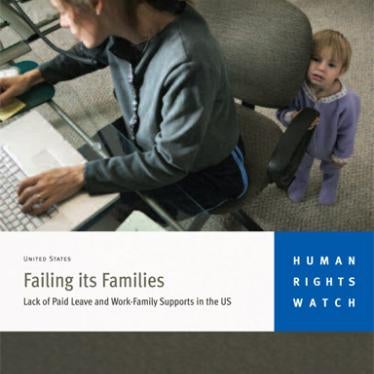This weekend, dad might peek over the hedge at the neighbors' Father's Day gifts. He'll probably see some nice stuff: a National Retail Federation survey found that Americans will spend on average $106 for Father's Day this year, with sporting goods, automotive accessories and electronics making popular gifts. But if dad wants to keep his spirits up, he'd better not peek over the hedge at other countries' paid paternity leave policies.
If he did, he'd see that fatherhood policies in America pale in comparison. In the United States, other than in California and New Jersey, there is no legal guarantee of paid leave from work for dads (or moms) when a child is born or adopted. The Family and Medical Leave Act guarantees only unpaid leave. But in more than 50 other countries, new dads are entitled to paid leave (and in 178, new moms are guaranteed paid leave). Paid paternity leave or parental leave available to either parent enables dads in these countries to take days, weeks or months of job-protected paid leave. In most, the pay is financed through cost-effective public insurance mechanisms, not employers.
Wage replacement for new dads varies in these countries. Over the hedge in Canada, new dads get 35 weeks of leave with 55 percent of pay through government employment insurance. United Kingdom dads can take two weeks paid at a variable rate, plus up to 26 weeks paid at a flat rate, or 90 percent of earnings if the mother returns to work. A few countries offer 100 percent of pay, including Denmark for 32 weeks, Spain for 15 days, and Slovenia for 37 weeks. Many offer a percentage of earnings, including Sweden (80 percent for 480 days, with 60 days for dads, 60 for moms, and the rest shared as the parents wish), and Germany (67 percent for up to a year, or longer in some cases). Some offer fixed amounts, such as Australia, which guarantees the minimum wage for 18 weeks.
In many countries, the number of dads taking paternity leave is rising, with two-thirds or more of fathers taking leave in Denmark, Finland, France, Sweden, the Netherlands and the U.K. Countries that designate a portion of leave for fathers only ("daddy days") have had swift increases in uptake. In Norway, the proportion of men taking leave increased from 4 percent to 89 percent after introduction of a take-it-or-leave-it portion of paid leave for dads.
Why are other countries paying parents to take time off work to care for their infants? It's because the modest investment - in Europe on average just 0.3 percent of gross domestic product - in paid leave for new parents pays off.
It pays off in terms of improved health and reduced health care costs. Paid and sufficiently long leaves for new parents are associated with lower infant mortality, lower risk of postpartum depression, higher rates of immunization for babies and higher breast-feeding rates. A Swedish study found higher breast-feeding rates for infants whose fathers took paternity leave. The U.S. could surely use help with breast-feeding rates: one study found that the U.S. could prevent nearly 900 infant deaths and save $13 billion a year in health care costs if 90 percent of mothers breast-fed exclusively for six months.
Paid leave for dads also pays off in terms of fathers' involvement in caring for children, bonding with babies and gender equality at home. A U.K. study found that fathers who took leave were more likely to change diapers, feed the baby and get up at night during the baby's first year.
Gender equality in the work force also gets a boost from dads' paid leave. The New York Times reported that in Sweden, a mother's future earnings increase on average 7 percent for every month the father takes leave.
Beyond the health and equality benefits, paid leave can benefit employers by enabling them to retain employees and avoid turnover costs, and it can improve the economy by increasing multifactor productivity. Moreover, paid leave for new dads correlates with economic competitiveness. A 190-country study found that 67 percent of the most economically competitive countries offer paid leave for new fathers, compared to 33 percent of the least competitive countries. Countries around the world are realizing that paid parental leave offers more benefits than costs. In tough economic times, they can't afford not to offer this benefit.
As American dads unwrap gifts this weekend, they will feel appreciated by their families. But they have cause to feel deeply unappreciated by U.S. policymakers. Dads should send a loud message to U.S. policymakers that a small investment in paid leave would be good for families, employers and the economy.







